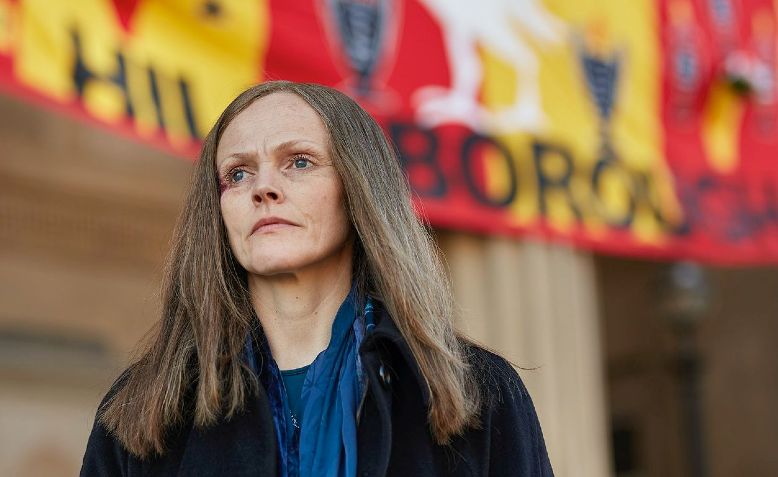 Anne, ITV
Anne, ITV
Anne is a powerful and harrowing portrayal of a grieving mother’s long battle for truth and justice against the institutions of the state, writes David McAllister
15th April 1989 is a day forever burned into the collective memory of Merseyside. The FA Cup semi-final between Liverpool and Nottingham Forest was to be played at Hillsborough Stadium in Sheffield, when a disastrous crush in the Leppings Lane end of the ground claimed the lives of 97 innocent people.
This unimaginable tragedy was compounded by the decades that followed. 23 years would pass before the extent of police neglect, lies and establishment cover-ups about the disaster would be revealed publicly.
Anne, showing on ITV, tells the bitterly painful story of how and why, all through the experience of Anne Williams (played brilliantly by Maxine Peake), the bereaved mother whose love for her son and need for truth became a powerful adversary to lies and corruption, ultimately making her a celebrated hero in the campaign for justice.
Though not fully dealt with within the scope of the series, the political context in which the Hillsborough disaster occurred is worth touching on. It was the 1980s – a decade in which Thatcher’s war on the working class and the welfare state was accompanied by brutal policing and a demonising of working class people, particularly within a game which had in truth been marred by violence in recent decades.
This contempt for working class people from various authority figures and the media runs through much of the series, and makes for some of the most stomach-churning moments. Whether it was a snide remark, a blocked information request, people trying to cover their backs, or of course The Sun‘s infamous headline blaming the Liverpool fans, this series carries a bitter message which may well resonate with people campaigning for justice today. We live under a government and a system which simply doesn’t think we matter.
But it was a failure of crowd control and poor health and safety protocol which caused the fatal crush at Hillsborough, then the delaying of the emergency response which condemned many who could have been saved. We can only imagine the pain Anne went through as we watch her gradually unpack the details, not only of how her son Kevin died, but also how he need not have.
But like the other Hillsborough families, she was not herself searching for the truth for the most part. She knew it fairly early on. Families had already unravelled this through their own efforts in the months and years immediately following the disaster. The campaign, from then on, was a fight to get this truth officially acknowledged, absolving the Liverpool fans of any blame and recognising them as victims of blunders, cover-ups and smears. Hillsborough was no accident. It was unlawful killing.
Being a thoroughly personal tale, much of the story focuses on the emotional toll the years of fighting take on Anne and her family, where on more than one occasion she is faced with the temptation to give up.
But she didn’t fight alone. Indeed, some of the most poignant and inspiring scenes are of those moments where we get the sense of the shared grief and collective struggle of the Hillsborough campaign, such as Anne’s first meeting with the Hillsborough Family Support Group, or the famous moment in 2009 when then-Culture Secretary Andy Burham speaks at Anfield and the response from the Liverpool fans transformed a day of remembrance into a day of defiance.
Sadly, Anne did not live to see the new verdict in 2016 of unlawful killing for which she had fought so hard. It is astonishing that despite this verdict, not one single person has been prosecuted. Just like with the campaign for truth and justice over Bloody Sunday which was 50 years ago this month, it is another example where years of struggle, in spite of all they have achieved in vindicating victims and those who fought for them, still have not succeeded in bringing the real villains to justice. Little wonder, then, that so much of our political, economic and media elite too often consider themselves above reproach.
This is an important story for two reasons. Firstly, it makes abundantly clear the sheer depths of corruption and deceit the police, and the system they serve, are capable of in order to protect themselves. But secondly, it shows the power of collective solidarity, not only in getting us through the darkest of times, but in taking on that system and holding those in power to account.
All four episodes of Anne are available on ITV Hub.
Before you go
Counterfire is growing faster than ever before
We need to raise £20,000 as we are having to expand operations. We are moving to a bigger, better central office, upping our print run and distribution, buying a new printer, new computers and employing more staff.

